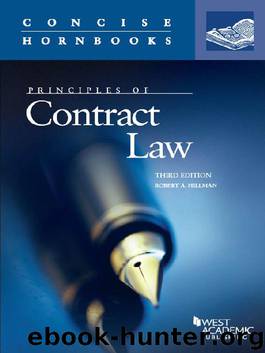Principles of Contract Law, 3d (Concise Hornbook Series) by Robert Hillman

Author:Robert Hillman [Hillman, Robert]
Language: eng
Format: epub
ISBN: 9780314288943
Publisher: West Academic
Published: 2013-12-05T18:30:00+00:00
219
Chapter 6
POLICING CONTRACTS
If you have read this book from the beginning, you now understand the principal ground for enforcing a promise, namely the existence of an agreement supported by consideration (a bargained-for exchange).1 In this chapter, we assume that the parties have made an agreement and that each promise is supported by consideration. What’s left to talk about, you say? The agreement may be unenforceable even though it satisfies the requirements of a bargained-for exchange because the promisor may have defenses based on one or more of the following “policing” doctrines that we are about to study: duress, fraudulent misrepresentation, fraudulent concealment, innocent misrepresentation, tortious breach of contract, public policy, and unconscionability. Further, we will see that misrepresentation, concealment, and other tort claims often entitle the injured party to affirmative recoveries. In this chapter, we also investigate the special problems of enforcement presented by standard-form contracts.2
Additional rules sometimes associated with policing doctrines involve the lack of capacity to contract. These include infancy and mental incapacity.3 The law in these areas is now largely statutory, so we will not cover them in detail here. But I can’t resist mentioning that “infancy” in most states means younger than twenty-one, not a crying baby. And for those who want at least a little more information here, one court nicely laid out the infancy doctrine and its purposes as follows:
The law governing agreements made during infancy reaches back over many centuries. The general rule is that ‘* * * the contract of a minor, other than for necessaries, is either void or voidable at his option.’ The only other exceptions to the rule permitting disaffirmance are statutory or involve contracts which deal with duties imposed by law such as a contract of marriage or an agreement to support an illegitimate 220
child. The general rule is not affected by the minor’s status as emancipated or unemancipated.
The underpinnings of the general rule allowing the minor to disaffirm his contracts were undoubtedly the protection of the minor. It was thought that the minor was immature in both mind and experience and that, therefore, he should be protected from his own bad judgments as well as from adults who would take advantage of him. The doctrine of the voidability of minors’ contracts often seems commendable and just. * * * However, in today’s modern and sophisticated society the ‘infancy doctrine’ seems to lose some of its gloss.4
Minors cannot disaffirm contracts for “necessaries” because contract law does not want to discourage people from contracting with minors for goods and services constituting essential needs of the minor.5 Policing doctrines generally deny enforcement of agreements when something is wrong with the process of forming the agreement or when the discrepancy between what each party receives is too large, or both.6 For example, contract law declines to enforce an “agreement” between you and your neighbor, Alice, made while you are holding a gun to her head. In addition, contract law balks at enforcing an agreement in which you promise to pay $1 for Alice’s $1000 watch, even if you didn’t use your assault weapon to procure the contract.
Download
This site does not store any files on its server. We only index and link to content provided by other sites. Please contact the content providers to delete copyright contents if any and email us, we'll remove relevant links or contents immediately.
The Social Psychology of Inequality by Unknown(3018)
The Plant Paradox by Dr. Steven R. Gundry M.D(2611)
The Writing on the Wall by Anselm Jappe(2039)
Working for Yourself by J.D. (Nolo) Stephen Fishman(1864)
Get What's Yours for Medicare by Philip Moeller(1679)
Every Landlord's Legal Guide by Janet Portman & Stewart Marcia & Ralph Warner(1663)
The First 20 Hours: How to Learn Anything ... Fast by Kaufman Josh(1661)
ADHD on Trial by Michael Gordon(1573)
Decisive by Chip Heath(1561)
Working for Yourself by Stephen Fishman J.D. (Nolo)(1525)
Drafting Contracts: How and Why Lawyers Do What They Do, Second Edition by Stark Tina L(1494)
A Practical Guide to International Arbitration in London by Hilary Heilbron(1434)
The Lord of the Rings: The Fellowship of the Ring, the Two Towers, the Return of the King by J. R. R. Tolkien(1430)
Restitution by Restitution(1424)
The Economist Aug 8th 2015 by The Economist(1421)
Intellectual Property Strategy by John Palfrey(1419)
The Economist Aug 29th 2015 by The Economist(1386)
Collusion by Luke Harding(1315)
Persuasion by Owner(1293)
